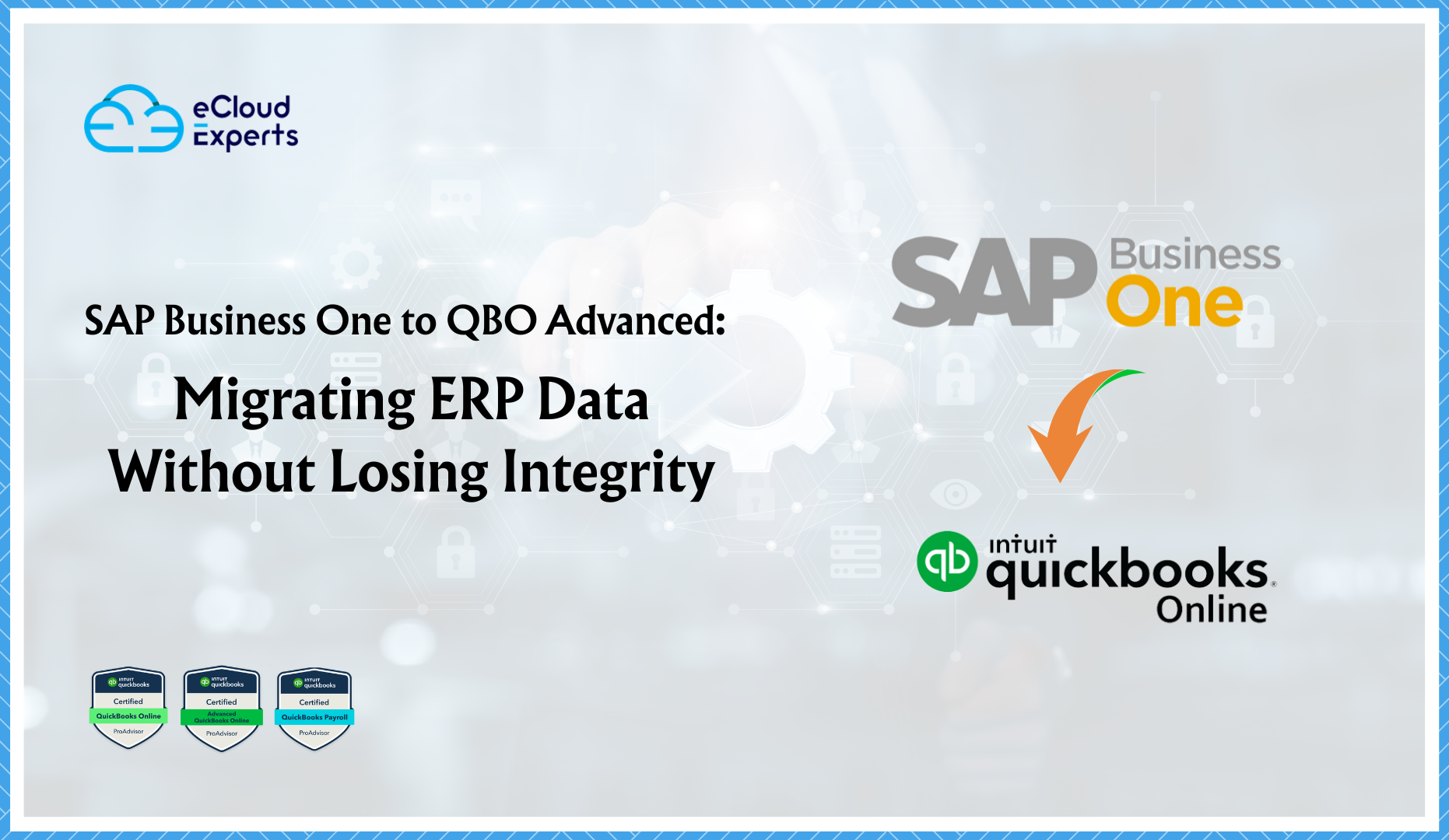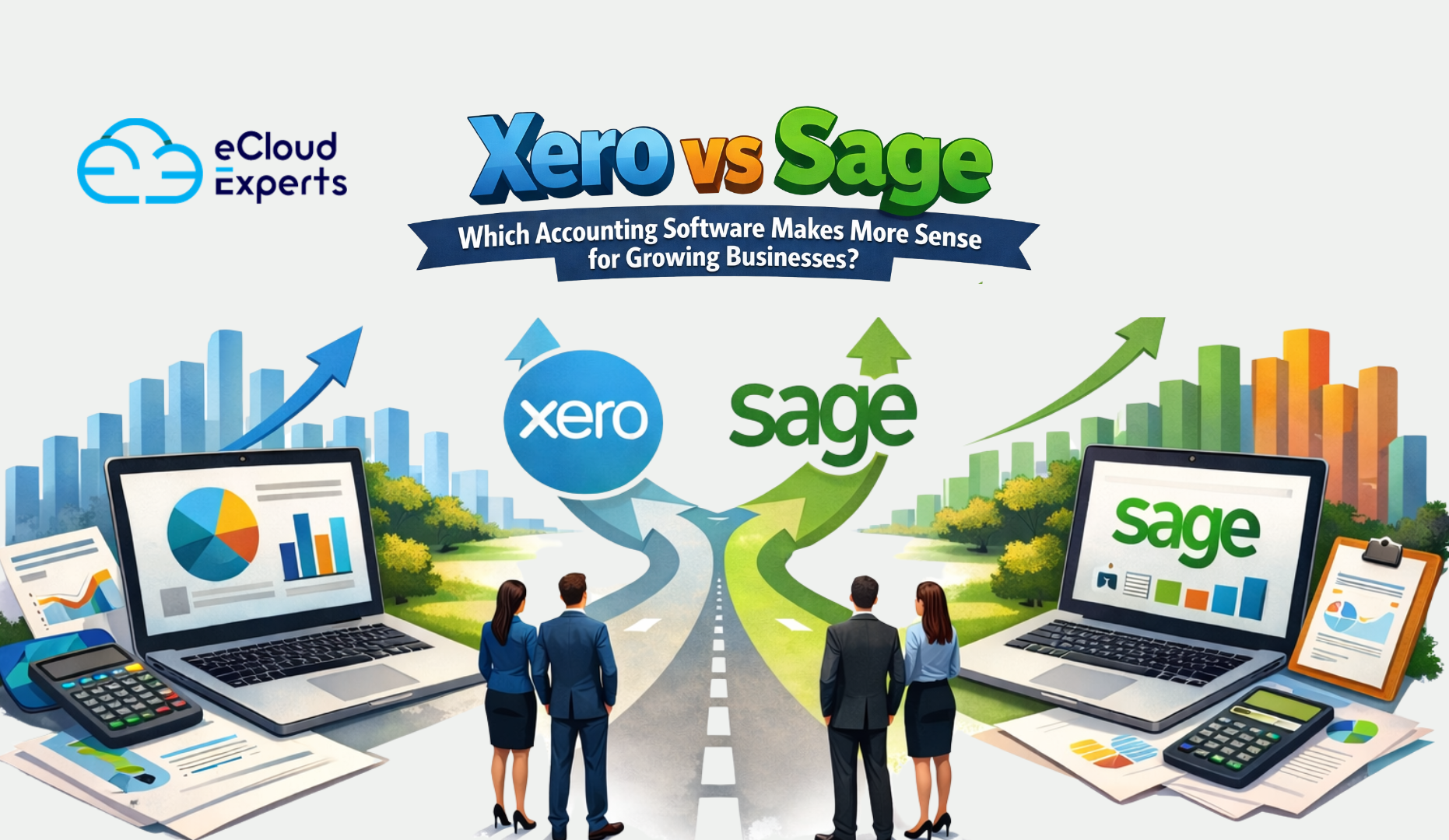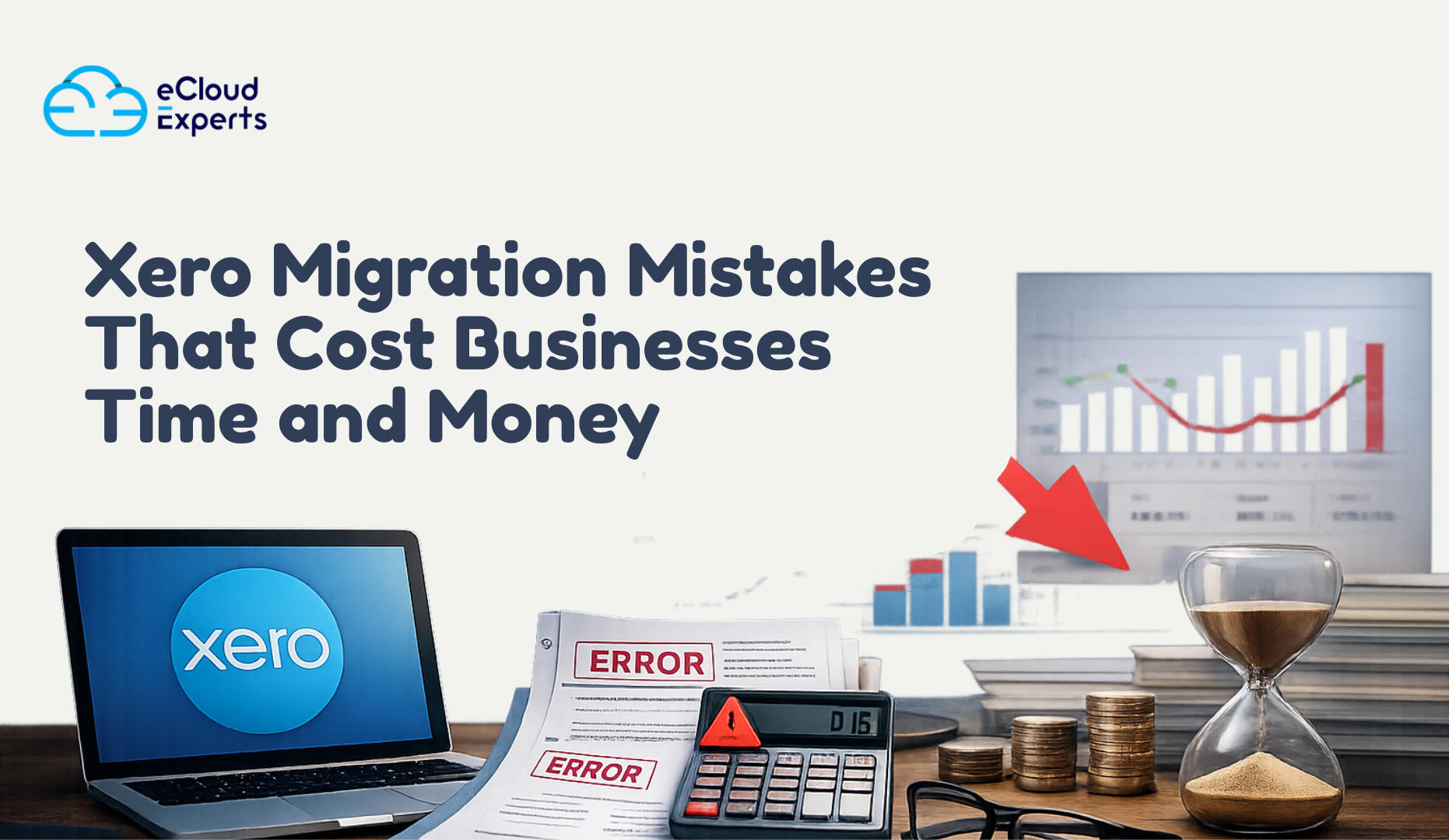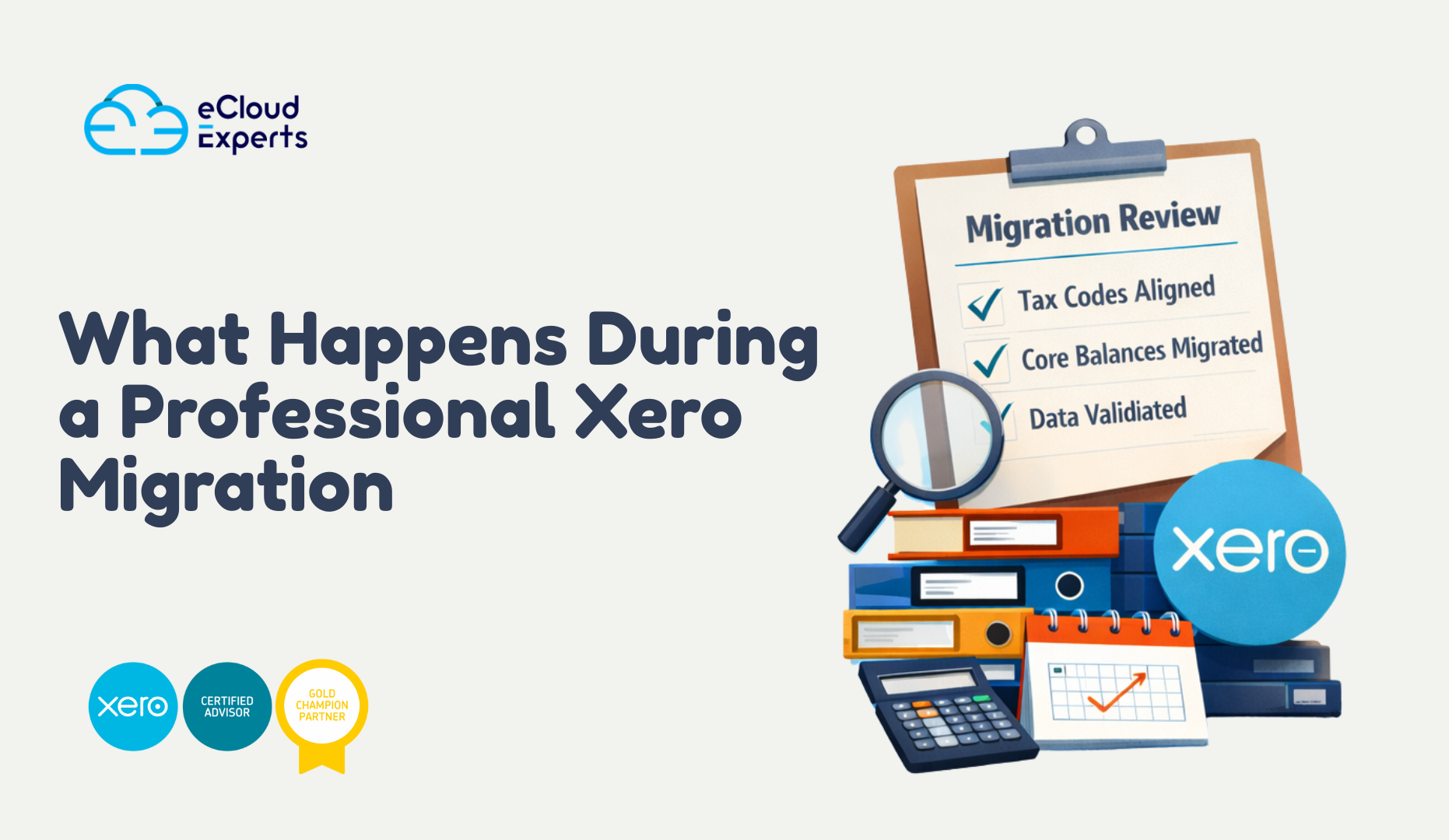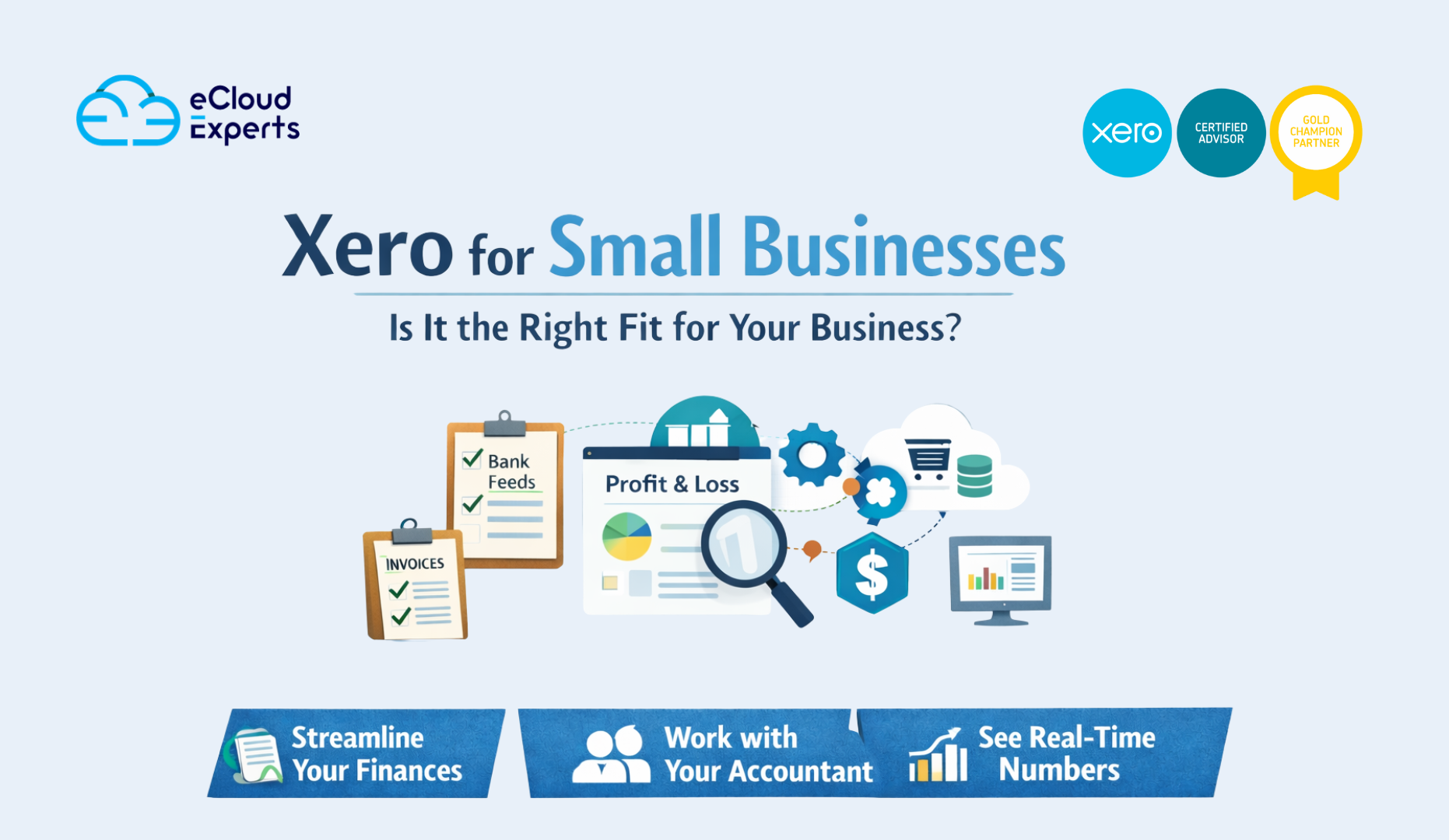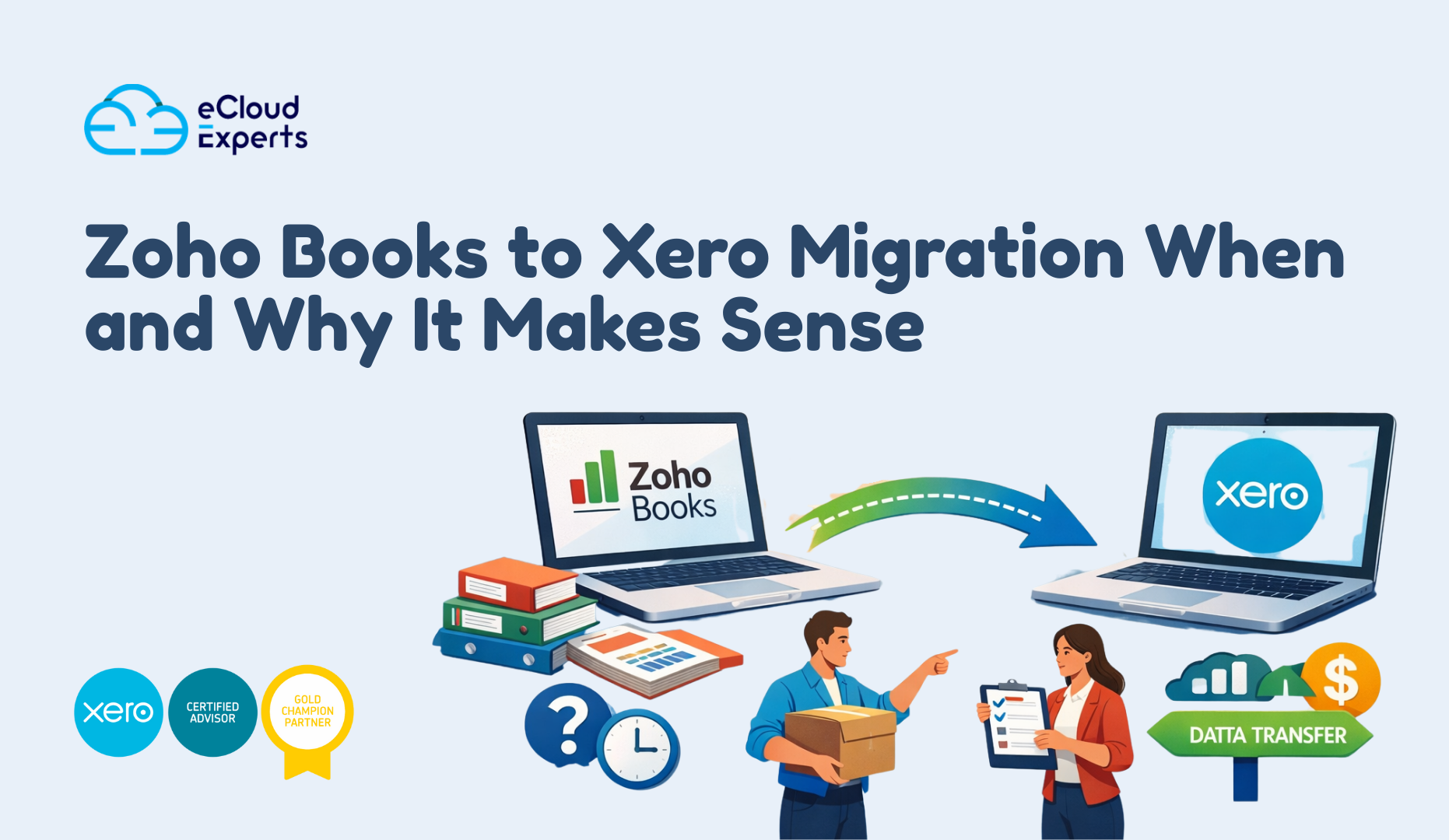Moving from an ERP system like SAP Business One to QBO Advanced is more than a software upgrade — it’s a critical business decision that can shape your operations for years to come. While QuickBooks Online Advanced offers greater flexibility, lower running costs, and powerful cloud-based features, many businesses hesitate to make the move. The biggest fear? Losing data integrity during migration.
ERP data isn’t just numbers and names it’s the complete record of your financial health, operational workflows, customer history, and compliance trail. A single mismatch, missing transaction, or formatting error can throw off reports, affect decision-making, and trigger compliance issues. That’s why a structured, methodical migration plan is essential to ensure every record arrives in QBO Advanced intact and accurate.
At eCloud Experts, we’ve helped countless businesses transition from SAP Business One to QBO Advanced without losing a single piece of essential data. In this guide, we’ll walk through why companies are making the switch, the challenges that can arise, and the proven strategies for keeping your ERP data clean, accurate, and audit-ready.
Why Businesses Move from SAP Business One to QBO Advanced
For many growing businesses, SAP Business One has been a reliable ERP solution. It offers robust functionality, but it’s also complex, resource-heavy, and often more than what a mid-sized company needs on a daily basis. Over time, the demands of maintaining SAP along with rising licensing and infrastructure costs lead business leaders to explore alternatives.
QuickBooks Online Advanced (QBO Advanced) has become one of the most popular destinations for companies outgrowing SAP Business One but still requiring strong reporting, automation, and integrations. It’s a cloud-based platform that delivers:
- Lower operating costs – With QBO Advanced, you eliminate expensive on-premise servers and ongoing ERP licensing fees.
- Anywhere, anytime access – A 100% cloud solution means your team can work securely from any location, ideal for hybrid and remote work models.
- Better integration ecosystem – QBO Advanced connects with a vast range of apps, from Shopify and Amazon to HubSpot, Bill.com, and Gusto.
- Simplified workflows – Processes like invoicing, payroll, and expense management become faster and easier, with less reliance on IT support.
- Scalable features – As your business grows, QBO Advanced offers role-based access, advanced reporting, and automation tools without the complexity of a full ERP.
The migration from SAP Business One to QBO Advanced isn’t about losing functionality — it’s about gaining flexibility and operational agility. But to unlock those benefits, the transition must be carefully managed so the integrity of your financial and operational data is never compromised.
The Risks of Losing Data Integrity During Migration
Migrating from SAP Business One to QBO Advanced can unlock major efficiency gains, but the process carries significant risks if not handled correctly. ERP data is interconnected a single mismatch in one area can create a ripple effect across your entire accounting system.
Here are some of the most common integrity challenges businesses face during migration:
- Missing transactions – If certain SAP data fields don’t map correctly to QBO Advanced, invoices, bills, or journal entries can be left behind.
- Duplicate records – Incorrect import settings can create double entries, inflating revenue or expenses.
- Data corruption – Formatting differences between SAP and QBO fields can lead to unreadable or incorrect data.
- Lost historical context – Some migrations only bring over balances, leaving behind transaction history that’s essential for audits and reporting.
- Compliance risks – If tax data or VAT codes don’t transfer accurately, you may face penalties or delays during filing periods.
The key challenge is that SAP and QBO Advanced use different data structures. SAP stores information in complex, relational databases, while QuickBooks uses a more simplified accounting model. Without expert mapping, critical links between customers, vendors, and transactions can break, causing major reporting errors.
At eCloud Experts, we’ve seen businesses lose months of financial clarity because of poorly executed migrations. The cost isn’t just in fixing the errors it’s in lost productivity, delayed reporting, and compliance headaches. That’s why every step of your SAP Business One to QBO Advanced migration must be designed with data integrity as the highest priority.
Preparing for Your SAP to QBO Advanced Migration
The success of your SAP Business One to QBO Advanced migration often depends on the preparation you do before the first file is moved. Skipping this stage can lead to incomplete transfers, mismatched balances, and costly rework later.
Here’s how to set the foundation for a smooth transition:
1. Back Up Your SAP Data
Before making any changes, create a complete backup of your SAP Business One database. This ensures you have a safe restore point if anything goes wrong during the migration.
2. Review and Clean Your Data
Old or unused records, such as inactive vendors or outdated product codes, should be archived or removed. The cleaner your source data, the easier it is to ensure accuracy in QBO Advanced.
3. Audit Your Chart of Accounts
Align your SAP chart of accounts with the structure you’ll use in QuickBooks. This step avoids unnecessary complexity and makes your reporting more intuitive in the new system.
4. Decide What to Migrate
Not every business needs its full history transferred. Some opt for opening balances only, while others bring over all historical transactions. The choice depends on compliance requirements, audit needs, and operational preferences.
5. Identify Special Data Requirements
Multi-currency accounts, VAT data, or custom fields in SAP often need special handling. These should be flagged early so your migration team can prepare accurate mapping.
By investing the time to prepare, you dramatically reduce the risk of data loss, mismatched balances, and compliance issues. This step also makes the actual migration to QBO Advanced faster and more predictable.
Key Data That Needs Careful Handling
Not all data is created equal when migrating from SAP Business One to QBO Advanced. Some records are more complex, tightly linked, or subject to compliance rules meaning they require extra care during extraction, mapping, and import.
Below are the critical data types that demand the most attention:
1. Financial Transactions
Invoices, bills, credit notes, journal entries, and payments form the backbone of your accounting records. Any loss or duplication here will distort your financial statements.
2. Customer and Vendor Records
Contact information, account histories, and outstanding balances need to be transferred in full to maintain smooth relationships and accurate collections/payments.
3. Inventory Items and Stock Levels
If you manage inventory in SAP, stock quantities, valuations, and item details must be migrated accurately to prevent fulfilment and costing errors in QBO Advanced.
4. Tax and VAT Data
VAT rates, tax codes, and historical tax reporting need careful mapping to QuickBooks’ tax settings to avoid filing mistakes.
5. Multi-Currency Transactions
If your business trades internationally, currency conversions and historical exchange rates must be preserved for accurate reporting and compliance.
6. Custom Fields and Notes
Many SAP systems store important operational details in custom fields. These may need special mapping or manual handling during migration.
Losing or corrupting any of these data categories can lead to operational disruption and financial inaccuracy. At eCloud Experts, we create detailed data mapping blueprints to ensure each element transfers correctly when moving from SAP Business One to QBO Advanced.
How eCloud Experts Preserves Data Integrity
When businesses switch from SAP Business One to QBO Advanced, they’re not just changing software they’re trusting that years of financial history will remain intact. At eCloud Experts, protecting that data is our top priority. We follow a proven, step-by-step process that combines advanced technology with hands-on expertise.
1. Precision Data Mapping
SAP and QBO Advanced structure data differently. We create a detailed mapping plan that aligns every SAP field with its correct QuickBooks counterpart from customer IDs to tax codes. This prevents mismatches and missing information.
2. Automated Validation Checks
Our migration tools run automated checks during import to flag duplicate entries, missing records, or formatting conflicts before the migration is finalized.
3. Audit-Ready Verification
Once the migration is complete, we run side-by-side comparisons of SAP and QBO Advanced reports to ensure balances, transaction counts, and historical data match exactly.
4. Secure Data Transfer
We use encrypted channels and secure authentication to protect sensitive financial data during the transfer, ensuring compliance with data protection regulations.
5. Specialist Handling for Complex Data
Whether it’s multi-currency transactions, detailed inventory, or industry-specific fields, our team applies tailored methods to ensure these records migrate without loss or corruption.
By combining automation with careful human review, eCloud Experts ensures your SAP Business One to QBO Advanced migration is not only accurate but also compliant, secure, and ready for business continuity from day one.
Testing and Verification After Migration
Even with careful planning, the migration from SAP Business One to QBO Advanced isn’t truly complete until your new system has been tested and verified. This stage ensures your data not only arrived intact but also works correctly in real-world use.
1. Trial Migration Runs
Before going live, we run a trial migration using a snapshot of your SAP data. This allows us to identify and fix any mapping issues, formatting problems, or missing records before the full transfer.
2. Side-by-Side Comparisons
We generate reports from both SAP Business One and QBO Advanced, comparing balances, transaction counts, and tax totals. Any discrepancies are investigated and corrected immediately.
3. Functional Testing
We test key workflows in QBO Advanced — such as creating invoices, applying payments, and running financial reports — to confirm they work as expected with your migrated data.
4. User Acceptance Testing (UAT)
Your finance team gets hands-on time in QBO Advanced to confirm that the system behaves as expected and that the data is where they need it.
5. Post-Migration Support
Even after go-live, we remain available to answer questions, fix minor issues, and guide your team in making the most of QBO Advanced.
This thorough verification process gives you peace of mind that your move from SAP Business One to QBO Advanced has preserved data integrity and operational readiness.
Real-World Example – A Successful Migration Story
One of our recent projects involved a UK-based manufacturing company that had been running on SAP Business One for over a decade. While SAP provided robust functionality, the system had become expensive to maintain and overly complex for their evolving needs. The management team wanted to move to QBO Advanced for its lower costs, cloud flexibility, and app integrations — but they were concerned about losing over ten years of financial and operational history.
The Challenge
Their SAP database contained:
- 75,000+ historical transactions
- Detailed inventory records with multiple warehouses
- Multi-currency accounts for both suppliers and customers
- Custom fields storing key production notes
They needed every piece of this data to transfer accurately to QBO Advanced without breaking the links between customers, vendors, inventory, and transactions.
Our Approach
We began with a detailed data audit to identify non-standard fields and any data inconsistencies. Then, we built a custom mapping blueprint to ensure every SAP field matched correctly in QBO Advanced.
The migration process included:
- Running a trial migration to test field compatibility
- Using automated validation to catch duplicates or missing entries
- Performing a full side-by-side report check after migration
- Training their finance and operations teams on QBO Advanced workflows
The Results
- 100% of critical historical transactions were preserved
- Inventory values matched to the penny across both systems
- Reporting accuracy improved thanks to a cleaner chart of accounts
- The finance team could now work from anywhere, with integrations to their CRM and eCommerce platforms
The client not only avoided data loss but also gained faster month-end closes, better reporting, and reduced IT overhead. This is exactly what we aim for in every SAP Business One to QBO Advanced migration a smooth, accurate transition with measurable operational benefits.
The ROI of a Well-Executed SAP to QBO Advanced Migration
Migrating from SAP Business One to QBO Advanced is not just about moving data it’s about unlocking long-term value for your business. When the migration is executed properly, the return on investment (ROI) becomes clear in both financial and operational terms.
1. Improved Reporting Accuracy
Accurate data means your financial reports truly reflect business performance. Decision-makers gain confidence in the numbers, enabling faster and better-informed strategic choices.
2. Reduced Operational Downtime
A clean, precise migration ensures your team can keep working without extended system outages or delays, saving both time and revenue.
3. Lower IT and Maintenance Costs
Moving to QBO Advanced eliminates expensive on-premise hardware, server maintenance, and ERP licensing fees. These savings compound over time.
4. Easier Compliance and Audit Processes
When historical data is preserved accurately, audits become smoother, tax filings are more reliable, and compliance risks are minimized.
5. Enhanced Business Agility
With QBO Advanced’s cloud-based flexibility, your business can integrate with new tools quickly, respond to market changes, and scale without major system overhauls.
The cost of getting a migration wrong can far outweigh the investment in doing it right. That’s why working with a trusted partner like eCloud Experts ensures your move from SAP Business One to QBO Advanced delivers maximum ROI not just on day one, but for years to come.
Conclusion: Protecting Your Data While Moving Forward
Switching from SAP Business One to QBO Advanced is a strategic decision that can streamline operations, reduce costs, and improve flexibility. But the migration is only successful if your financial and operational data arrives intact, accurate, and ready to use.
The risks of lost transactions, mismatched balances, or corrupted records are real and fixing them after the fact can be time-consuming and expensive. That’s why partnering with a specialist migration team is essential. At eCloud Experts, we combine advanced migration tools, meticulous data mapping, and rigorous post-migration testing to ensure your move is smooth, compliant, and free from data integrity issues.
If you’re planning to transition from SAP Business One to QBO Advanced, don’t leave your data to chance. Let’s make sure your business keeps every record, every balance, and every advantage.
Book your free SAP to QBO Advanced migration consultation with eCloud Experts today and move forward with complete confidence.

